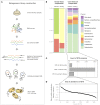Current and future resources for functional metagenomics
- PMID: 26579102
- PMCID: PMC4625089
- DOI: 10.3389/fmicb.2015.01196
Current and future resources for functional metagenomics
Abstract
Functional metagenomics is a powerful experimental approach for studying gene function, starting from the extracted DNA of mixed microbial populations. A functional approach relies on the construction and screening of metagenomic libraries-physical libraries that contain DNA cloned from environmental metagenomes. The information obtained from functional metagenomics can help in future annotations of gene function and serve as a complement to sequence-based metagenomics. In this Perspective, we begin by summarizing the technical challenges of constructing metagenomic libraries and emphasize their value as resources. We then discuss libraries constructed using the popular cloning vector, pCC1FOS, and highlight the strengths and shortcomings of this system, alongside possible strategies to maximize existing pCC1FOS-based libraries by screening in diverse hosts. Finally, we discuss the known bias of libraries constructed from human gut and marine water samples, present results that suggest bias may also occur for soil libraries, and consider factors that bias metagenomic libraries in general. We anticipate that discussion of current resources and limitations will advance tools and technologies for functional metagenomics research.
Keywords: RK2; cloning bias; cosmid library; fosmid library; functional metagenomics; library bias; metagenomic library; pCC1FOS.
Figures

Similar articles
-
Developing a Bacteroides System for Function-Based Screening of DNA from the Human Gut Microbiome.mSystems. 2018 Mar 27;3(3):e00195-17. doi: 10.1128/mSystems.00195-17. eCollection 2018 May-Jun. mSystems. 2018. PMID: 29600285 Free PMC article.
-
Strong spurious transcription likely contributes to DNA insert bias in typical metagenomic clone libraries.Microbiome. 2015 May 20;3:22. doi: 10.1186/s40168-015-0086-5. eCollection 2015. Microbiome. 2015. PMID: 26056565 Free PMC article.
-
Preparation of fosmid libraries and functional metagenomic analysis of microbial community DNA.Methods Enzymol. 2013;531:123-42. doi: 10.1016/B978-0-12-407863-5.00007-1. Methods Enzymol. 2013. PMID: 24060119
-
Metagenomics: Probing pollutant fate in natural and engineered ecosystems.Biotechnol Adv. 2016 Dec;34(8):1413-1426. doi: 10.1016/j.biotechadv.2016.10.006. Epub 2016 Nov 5. Biotechnol Adv. 2016. PMID: 27825829 Review.
-
[Advances of metagenomics in discovering novel biocatalysts].Sheng Wu Gong Cheng Xue Bao. 2012 Apr;28(4):420-31. Sheng Wu Gong Cheng Xue Bao. 2012. PMID: 22803392 Review. Chinese.
Cited by
-
Construction and characterization of DNA libraries from cultured phages and environmental viromes.Appl Environ Microbiol. 2024 Oct 23;90(10):e0117124. doi: 10.1128/aem.01171-24. Epub 2024 Sep 24. Appl Environ Microbiol. 2024. PMID: 39315792 Free PMC article.
-
Developing a Bacteroides System for Function-Based Screening of DNA from the Human Gut Microbiome.mSystems. 2018 Mar 27;3(3):e00195-17. doi: 10.1128/mSystems.00195-17. eCollection 2018 May-Jun. mSystems. 2018. PMID: 29600285 Free PMC article.
-
Enrichment allows identification of diverse, rare elements in metagenomic resistome-virulome sequencing.Microbiome. 2017 Oct 17;5(1):142. doi: 10.1186/s40168-017-0361-8. Microbiome. 2017. PMID: 29041965 Free PMC article.
-
Metagenomic Exploration of Plastic Degrading Microbes for Biotechnological Application.Curr Genomics. 2020 May;21(4):253-270. doi: 10.2174/1389202921999200525155711. Curr Genomics. 2020. PMID: 33071619 Free PMC article. Review.
-
Discovery of novel carbohydrate degrading enzymes from soda lakes through functional metagenomics.Front Microbiol. 2022 Dec 7;13:1059061. doi: 10.3389/fmicb.2022.1059061. eCollection 2022. Front Microbiol. 2022. PMID: 36569080 Free PMC article.
References
-
- Ayres E. K., Thomson V. J., Merino G., Balderes D., Figurski D. H. (1993). Precise deletions in large bacterial genomes by vector-mediated excision (VEX): the trfA gene of promiscuous plasmid RK2 is essential for replication in several Gram-negative hosts. J. Mol. Biol. 230, 174–185. 10.1006/jmbi.1993.1134 - DOI - PubMed
LinkOut - more resources
Full Text Sources
Other Literature Sources

